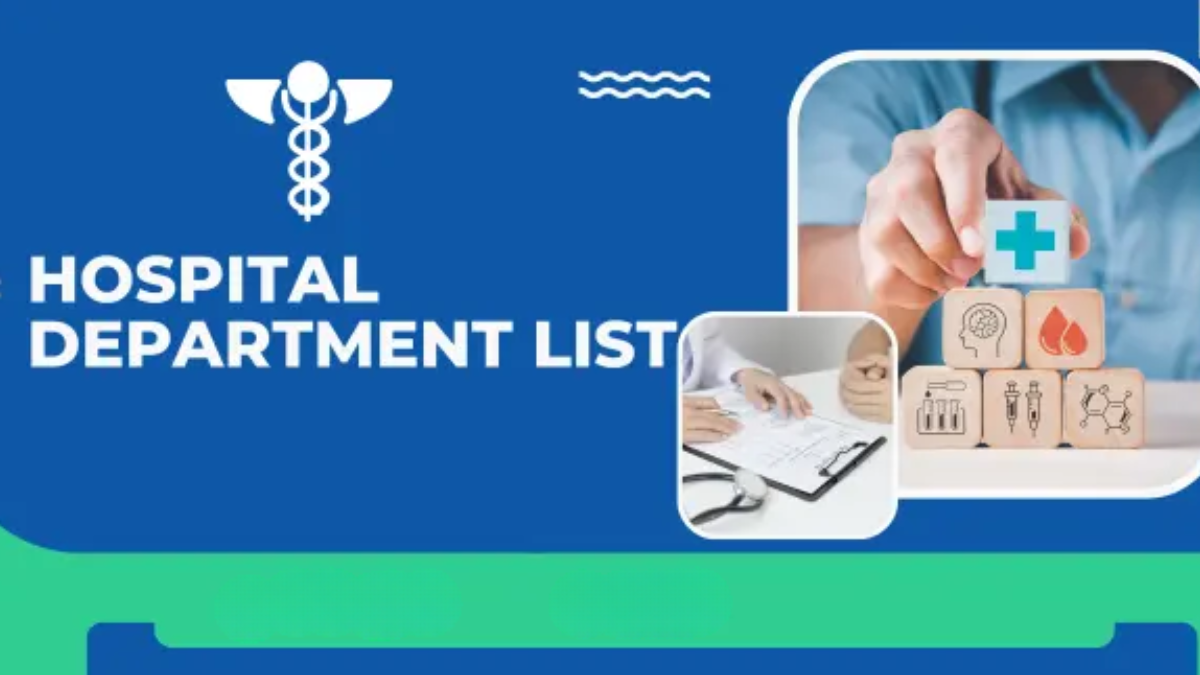Hospitals are organized into various departments, each specializing in specific areas of medical care. This structure allows hospitals to manage different health conditions effectively while ensuring that patients receive specialized treatment. Understanding hospital departments and their functions helps patients navigate healthcare facilities with confidence and seek the right care when needed.
Importance of Hospital Departments
- Specialization: Each department focuses on a particular area of medicine.
- Efficiency: Patient flow is managed effectively through designated services.
- Comprehensive Care: Patients have access to multiple specialists under one roof.
- Advanced Facilities: Departments are equipped with technology specific to their field.
- Collaboration: Different departments work together to ensure holistic treatment.
Major Hospital Departments and Their Functions
1. Emergency Department (ER)
- Handles urgent, life-threatening cases.
- Manages trauma, accidents, strokes, heart attacks, and severe injuries.
- Open 24/7 with specialized staff and equipment.
2. Outpatient Department (OPD)
- For patients who don’t need admission.
- Provides consultations, check-ups, minor treatments, and follow-ups.
- Helps reduce hospital stays while ensuring proper care.
3. Inpatient Department
- Manages patients admitted for observation, surgery, or treatment.
- Includes general wards, semi-private, and private rooms.
- Provides round-the-clock monitoring, nutrition, and medication.
4. Surgery Department
- Conducts operations ranging from minor to major procedures.
- Includes general surgery, orthopedic surgery, cardiac surgery, and neurosurgery.
- Equipped with operation theaters, anesthesia teams, and recovery units.
5. Intensive Care Unit (ICU)
- For critically ill patients needing constant monitoring.
- Equipped with ventilators, advanced monitoring systems, and life-support machines.
- Staffed by intensivists and trained critical care nurses.
6. Radiology and Imaging Department
- Provides diagnostic services through X-rays, CT scans, MRIs, and ultrasounds.
- Supports accurate diagnosis for other departments.
- Essential in cancer, neurology, cardiology, and trauma care.
7. Laboratory and Pathology Department
- Conducts blood, urine, and tissue tests.
- Includes microbiology, hematology, and biochemistry labs.
- Helps in early disease detection and monitoring treatments.
8. Cardiology Department
- Focuses on heart-related conditions.
- Provides ECG, echocardiography, angiography, and angioplasty.
- Manages hypertension, heart failure, and cardiac emergencies.
9. Neurology Department
- Specializes in brain and nervous system disorders.
- Treats epilepsy, Parkinson’s disease, migraines, and strokes.
- Collaborates with neurosurgeons for surgical interventions.
10. Oncology Department
- Dedicated to cancer detection and treatment.
- Provides chemotherapy, radiation therapy, and surgical oncology.
- Includes palliative care for terminal patients.
11. Pediatrics Department
- Focuses on child health from infancy to adolescence.
- Provides vaccinations, growth monitoring, and treatment for childhood illnesses.
- Neonatal intensive care units (NICU) for premature babies.
12. Gynecology and Obstetrics Department
- Women’s health and maternity services.
- Covers prenatal, childbirth, and postnatal care.
- Manages menstrual disorders, infertility, and gynecological surgeries.
13. Orthopedics Department
- Deals with bones, joints, and muscular issues.
- Provides fracture management, joint replacements, and spinal surgeries.
- Offers physiotherapy and rehabilitation support.
14. Psychiatry and Mental Health Department
- Provides counseling, therapy, and psychiatric treatment.
- Manages anxiety, depression, schizophrenia, and substance abuse.
- Offers both inpatient and outpatient mental health services.
15. Rehabilitation and Physiotherapy Department
- Helps patients recover after injury, surgery, or illness.
- Offers physical, occupational, and speech therapy.
- Enhances mobility, strength, and daily functioning.
Supportive Hospital Departments
- Pharmacy: Dispenses medicines prescribed by doctors.
- Nutrition and Dietetics: Provides dietary advice and meal planning.
- Administration: Manages hospital operations, billing, and insurance.
- Housekeeping and Sanitation: Ensures hygiene and infection control.
- Medical Records: Maintains patient histories and reports.
Role of Collaboration Between Departments
Departments do not function in isolation. For instance:
- Emergency patients may need radiology, surgery, and ICU support.
- Oncology patients require diagnostics, surgery, radiation, and counseling.
- Cardiology often works with radiology, surgery, and rehabilitation.
This collaboration ensures holistic treatment and better patient outcomes.
FAQs About Hospital Departments
1. What is the purpose of hospital departments?
They divide healthcare into specialized sections to provide efficient and focused treatment.
2. What is the difference between OPD and IPD?
OPD treats patients without admission, while IPD requires patients to stay in the hospital for treatment.
3. Why is the emergency department important?
It saves lives by providing immediate care in accidents, trauma, and critical illnesses.
4. What services does radiology provide?
X-rays, MRIs, CT scans, ultrasounds, and other imaging for diagnosis.
5. Do all hospitals have an ICU?
Yes, most modern hospitals have ICUs for critically ill patients.
6. What role does pediatrics play in hospitals?
It ensures the health of children through vaccinations, growth monitoring, and treatment of childhood illnesses.
7. What does oncology mean in hospitals?
Oncology deals with cancer prevention, detection, and treatment.
8. How does rehabilitation help patients?
It helps patients recover mobility, strength, and independence after surgeries or illness.
9. What is the difference between cardiology and neurology?
Cardiology deals with the heart, while neurology deals with the brain and nervous system.
10. Do hospitals provide mental health services?
Yes, modern hospitals have psychiatry and mental health departments for counseling and treatment.

